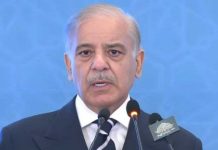LAHORE, Oct 11 (APP/DNA):Federal Minister for Planning, Development and Special Initiatives Prof. Ahsan Iqbal has warned that Pakistan is facing a “toxic air crisis,” calling it a “battle for survival” and a “national health emergency.” He urged collective national action to confront what he described as one of the gravest threats to the country’s future. Addressing the ‘Breathe Pakistan’ conference here on Saturday, the minister said the deteriorating air quality was no longer an environmental issue but a direct threat to public health and economic stability.
“The very air we breathe has become our enemy. This is about survival, about the future of our children,” he stated. He noted that Lahore’s Air Quality Index (AQI) had touched 400, which he termed a “red alert for the nation,” while data from other major cities also showed dangerously high pollution levels throughout the year.
Sharing his recent observation at a pollution-mapping project at ITU, Ahsan Iqbal said the findings revealed that air pollution persists even during summer months. “What we see as smog in winter is, in fact, a year-round reality,” he remarked. He added that breathing urban air in Pakistan was equivalent to smoking two packs of cigarettes daily, warning of a “silent public health emergency” as cases of respiratory diseases and premature births rise sharply. Citing the World Bank, he said over 100,000 Pakistanis die prematurely each year due to pollution.
The planning minister stressed that the government alone cannot overcome this crisis. “Citizens, industries, and institutions must work together to secure a clean and healthy environment,” he said, emphasizing that climate change was a man-made crisis requiring shared responsibility.
He called on the corporate sector to adopt green technologies and sustainable supply chains, noting that clean air was not a privilege but a fundamental right. Ahsan Iqbal criticized developed nations for failing to meet their $100 billion climate finance commitments. “For decades, they asked us to ‘do more.’ Now we ask them to ‘do more’, to deliver on their promises and ensure the transfer of clean technologies instead of lectures,” he asserted. He highlighted Pakistan’s ongoing green initiatives, including Uraan Pakistan, the Punjab Smog Control Strategy, and the Green Balochistan Initiative.
He said 40 percent of urban transport was being converted to electric and hybrid systems to reduce emissions, while air quality monitors were being installed to track pollution levels.
“The clean air challenge is not limited to Lahore, it affects Karachi, Faisalabad, Peshawar, and every urban center in Pakistan,” he said. “We must act decisively so that one day, our skies turn blue again.”
He also described the ‘Breathe Pakistan’ conference as a timely and significant step, emphasizing that the conference was not only about combating pollution but also about fostering leadership, partnership, and collaboration for a sustainable future.

















